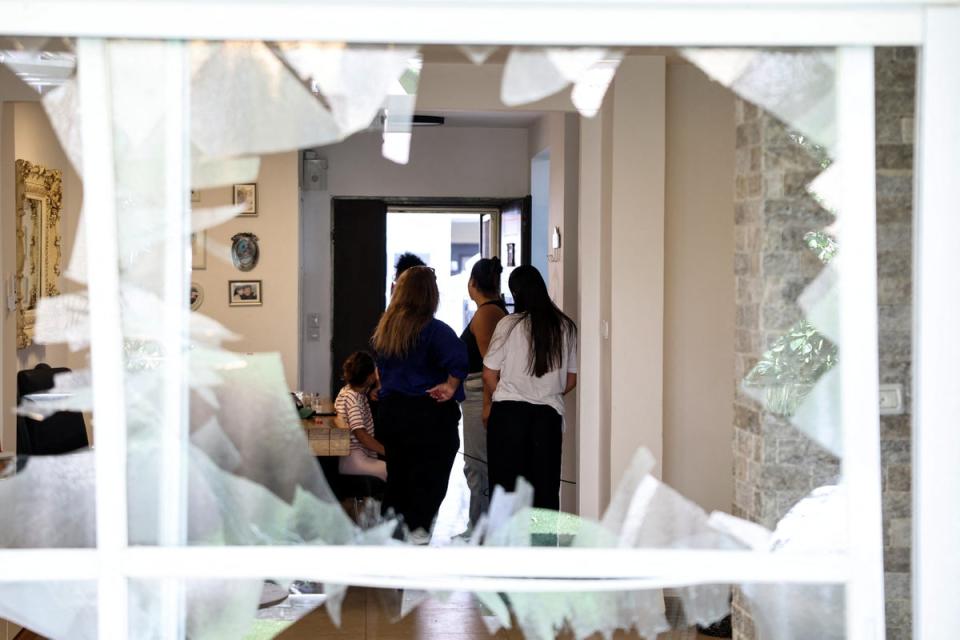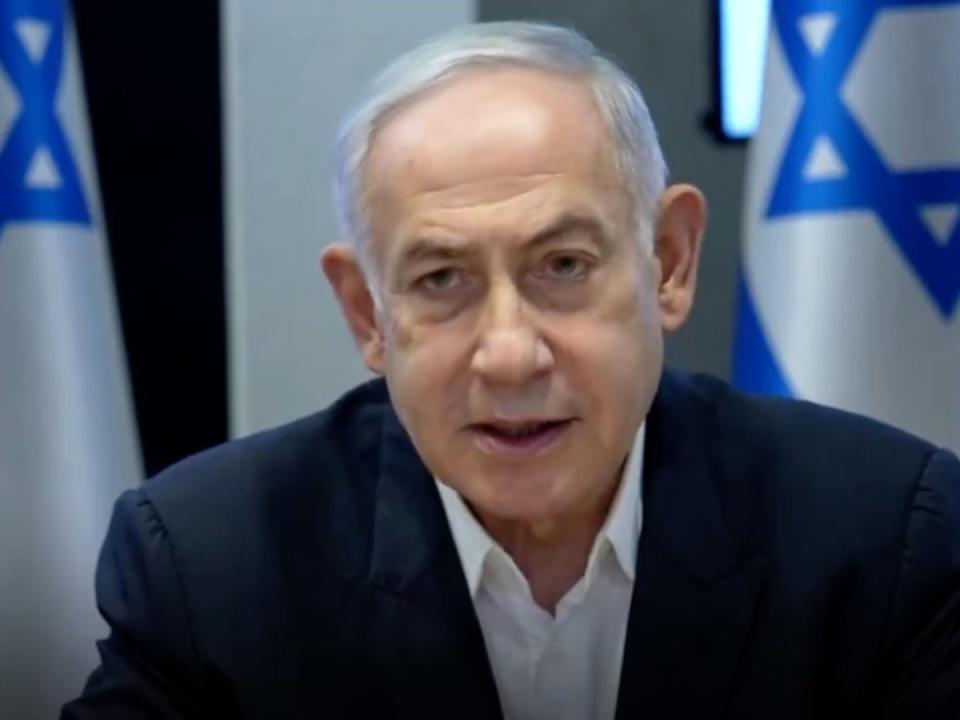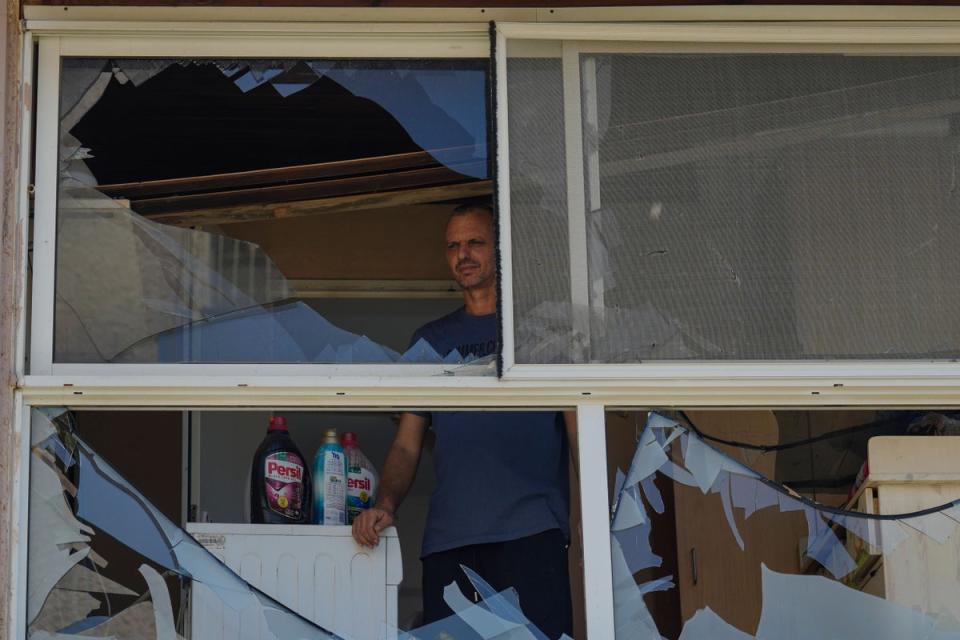Israeli Prime Minister Benjamin Netanyahu has warned that “this is not the end” as Israel and Iran-backed Hezbollah exchange fire in southern Lebanon in an escalating Middle East conflict.
The cross-border missile, rocket and drone fire was the biggest day of attacks since the conflict between Hezbollah and Israel was reignited last October, after the Iranian-backed group Hamas led deadly attacks into Israel.
Israel’s military said it had struck Lebanon, a southern part controlled by Hezbollah, on Sunday morning with about 100 jets to prevent an attack by Iran-backed militias.
Hezbollah then fired hundreds of projectiles and drones at Israel, admitting they fired 320 Katyusha rockets and 11 military targets in what it called the “first phase” of retaliation for Israel killing Fuad Shukr, a senior Hezbollah commander, last month.
“What happened today is not the end of the story,” Mr Netanyahu said in a statement posted on X, formerly Twitter.

“Hezbollah tried to attack the state of Israel this morning with rockets. We instructed the (Israeli military) to carry out a strong pre-emptive strike to remove the threat.
“The (Israeli military) destroyed thousands of short-range rockets that were all intended to harm our citizens and forces in the Galilee. In addition, (the Israeli military) intercepted all UAVs (unmanned aerial vehicles) sent to strategic targets in the middle of the country.
“We attacked Hezbollah with a stunning blow. Three weeks ago we removed the chief of staff and today we stopped the attack.
Referring to Hezbollah leader Hassan Nasrallah and Iran’s ruler Ali Khamenei, Mr Netanyahu added that the pair “must understand this is another step to change the situation in the north”.

Hezbollah denied Mr Netanyahu’s claim that it had planned to fire thousands of rockets and that the Israeli strike had reduced the scope of the airstrikes.
Mr. Nasrallah, speaking late Sunday, claimed that Hezbollah had not used precision missiles in attacks but could use them in the future.
“We will evaluate the impact of the current operation. If the results do not seem sufficient, we will respond at another time,” he said.
In a lengthy speech, he added that Hezbollah had targeted Israeli military intelligence bases outside Tel Aviv and had not targeted civilian infrastructure. Photos from the Israeli coastal city of Acre showed several houses damaged by rockets, although no civilians were killed.
Missiles were seen arcing across the morning sky, leaving a dark vapor trail behind them, as air raid sirens sounded over Israel and distant explosions lit up the horizon, as smoke billowed over homes in Khiam in southern Lebanon.

Three civilian deaths were confirmed in Lebanon but none in Israel, where damage appeared to be limited.
However, Israel said one navy soldier was killed and two wounded during the fighting in the northern region.
It did not provide details on the soldier’s condition, but Israeli media reported the incident was on a naval vessel offshore when an interceptor from Israel’s Iron Dome air defense system intercepted a drone fired by Hezbollah.
Any major escalation in the fighting, which began in parallel with the war in Gaza, risks morphing into a regional conflagration drawing on Hezbollah’s backer Iran and Israel’s main ally the United States.
But officials and diplomats on both sides of the conflict indicated that an all-out war would not break out.
Israel’s foreign minister said the country was not seeking a full-scale war. Diplomats who spoke on condition of anonymity later claimed Israel and Hezbollah had exchanged messages through intermediaries to prevent further escalation.
He said the main message was that both sides considered Sunday’s exchange of bombs “over” and that neither side wanted a full-scale war.
The White House said US president Joe Biden was following the event. “We will continue to support Israel’s right to defend itself, and we will continue to work for regional stability,” National Security Council spokesman Sean Savett said.
The UN peacekeeping force in Lebanon and the country’s special coordinator’s office called on all parties to desist, calling the development “worrying”.
Egypt, one of the mediators in the Gaza ceasefire talks, warned of the danger of opening a new war in Lebanon. British foreign secretary David Lammy also called for escalation to be avoided “at all costs”.
Speaking to Sky News on Sunday, Chancellor of the Duchy of Lancaster Pat McFadden said the UK was “deeply concerned” by the escalation.
“Even if this happens, the British government and the international community will ask all parties not to escalate and avoid a major regional war. This is a real danger facing the region,” he said.
Hezbollah and Israel have been exchanging projectiles almost daily since Iran-backed Hamas launched a deadly attack on Israel on October 7, killing 1,200 people and taking 251 more hostages.
Israeli air and ground attacks on the Gaza Strip, which have continued despite calls for peace around the world, have killed at least 40,400 Palestinians in the enclave, according to local health officials.
Hamas and the Houthis, another Iran-backed militia that controls parts of Yemen, both praised Hezbollah’s latest attack on Israel.




